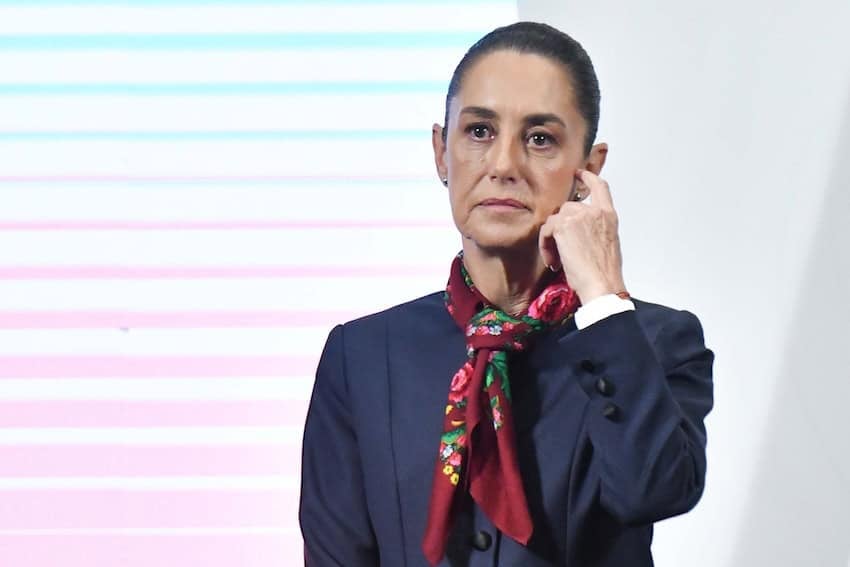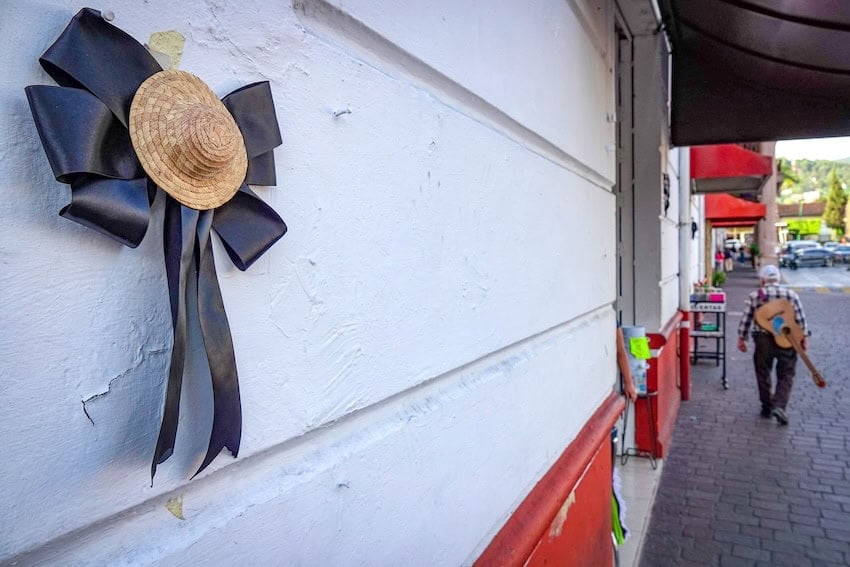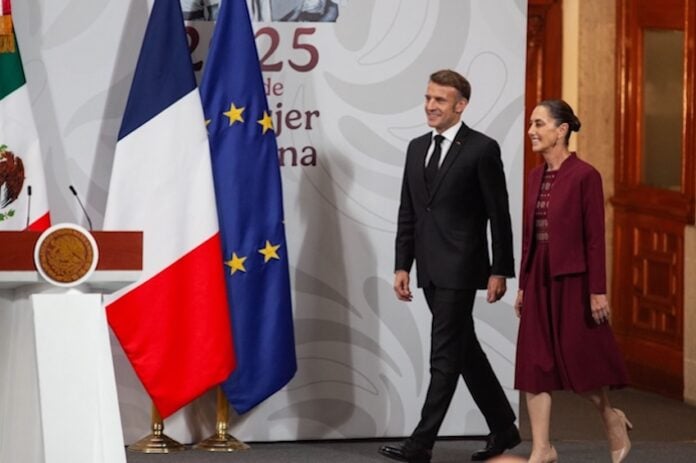President Claudia Sheinbaum held her final morning press conference of the week shortly before welcoming French President Emmanuel Macron to the National Palace.
“Today we’re going to have a brief press conference because at 9:40 a.m. the president of France is coming,” Sheinbaum told reporters at the beginning of her mañanera.
The first section of her presser included an update on the construction of the Gulf of Mexico rail project, which will link Mexico City to the northern border city of Nuevo Laredo, and performances by groups of young singers and musicians, who helped Culture Minister Claudia Curiel promote the 2025 Community Cultures Festival, which will be held in Mexico City’s central square on Nov. 22.
Later in the mañanera, Sheinbaum received questions on a range of topics, including the murder of the mayor of Uruapan, Michoacán, last Saturday, and her designation as a persona non grata by the Congress of Peru.
‘Nobody wants young people to get involved with criminal groups’
A reporter noted that the alleged murderer of Carlos Manzo was a 17-year-old boy, who was shot dead shortly after he allegedly opened fire on the mayor of Uruapan during a Day of the Dead event in the city last Saturday night.

(Mario Jasso/Cuartoscuro.com)
Asked “what is happening” in Mexico that leads young people to get involved in organized crime, Sheinbaum first pointed out that her government’s security strategy is not just about “the presence of security forces, the strengthening of prosecutor’s offices and arrests.”
Another part of the strategy, she continued, is providing “attention to the causes” of crime, such as poverty and lack of opportunity.
“No Mexican man or Mexican woman, or anyone, wants young people to get involved with criminal groups,” Sheinbaum said without directly answering the reporters’s question.
She went on to claim that young people in Mexico were “abandoned” for 36 years, a reference to what she and others call the country’s “neoliberal” period between 1982 and 2018.
Sheinbaum said that her government’s objective is to give young people “options” so that they don’t look at organized crime as a “life choice.”
Those options are provided “through culture, sport and education,” she said.
“… A security strategy must include the … presence of the police, the National Guard, federal forces if necessary, as well as intelligence, investigation, coordination [between authorities], arrests, and prosecution,” Sheinbaum said.
“But it must also include attention to the causes [of crime], embracing young people,” she said.
“The [political] right was very critical of ‘hugs, not bullets‘ because they said that it was ‘hugs for criminals,'” she added, referring to the nickname of the security strategy implemented by former president Andrés Manuel López Obrador, whose government favored addressing the root causes of crime through welfare and social programs over combating criminal groups with force.
“False,” Sheinbaum said of the “hugs for criminals” assessment.
“Nobody ever suggested that. The issue is that you have to take an interest in young people. … We have to do everything we can so that no young person gets involved in a criminal group. That’s our vision and we have to keep working on it every day,” she said.
“That’s what the Plan Michoacán for Peace and Justice is for,” Sheinbaum said, referring to a government initiative developed in response to Manzo’s murder and general insecurity in the state, one of Mexico’s most violent.
“… There has to be more schools, more care, more culture, more sport, so that young people feel cared for and they don’t see joining a criminal group as an option that … appears to be an option that will give them money, but is ultimately a choice of death,” she said.
Mexican government ‘rejects’ Peru’s persona non grata declaration against Sheinbaum
Sheinbaum declined to comment on the Peruvian Congress’ declaration of her as a “persona non grata,” noting that the Ministry of Foreign Affairs (SRE) already responded to the development.
The Associated Press reported that the Peruvian Congress’ decision on Thursday “was adopted with 63 votes in favor, 34 against and two absent, after a debate in which right-wing congresspersons argued that Sheinbaum has maintained a hostile position toward Peru since she took office in 2024 by backing former Peruvian President Pedro Castillo.”
The persona non grata declaration came three days after the government of Peru severed diplomatic relations with Mexico in light of a former Peruvian prime minister, who is accused of rebellion, being granted asylum at the Mexican Embassy in Lima.

The SRE response Sheinbaum referred to was a statement posted to social media on Thursday afternoon.
“The Government of Mexico rejects the declaration of persona non grata against the President of the United Mexican States, Dr. Claudia Sheinbaum Pardo, approved by the Congress of Peru on this date, as it is based on false premises,” the foreign ministry said.
The SRE asserted that “Mexico has in no way intervened in the internal affairs of Peru,” and has remained “faithful” to its foreign policy principles and “strong diplomatic tradition.”
The ministry said that the granting of political asylum to “the citizen Betssy Betzabet Chávez Chino was decided in strict adherence to the applicable international law on the matter, which is binding for both Mexico and Peru.”
Chávez served as prime minister under Pedro Castillo and is accused of colluding with the former president on his attempt to dissolve Peru’s Congress in late 2022 when lawmakers were preparing an impeachment vote against him. Castillo’s attempt failed and he was ousted by the Congress. Sheinbaum, like López Obrador, has claimed that he was the victim of a “coup.”
The SRE concluded its statement by highlighting that “the General Assembly of the United Nations has declared that political asylum is a peaceful and humanitarian act, which cannot be regarded as unfriendly by any other state.”
On Tuesday, Sheinbaum said that Mexico’s trade and consular relationship with Peru would continue despite the breaking of diplomatic ties. The two countries are part of the Pacific Alliance trade bloc along with Chile and Colombia.
By Mexico News Daily chief staff writer Peter Davies (peter.davies@mexiconewsdaily.com)
